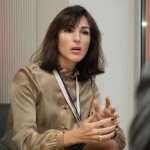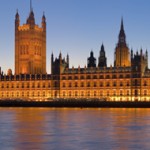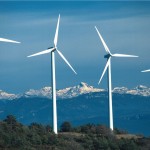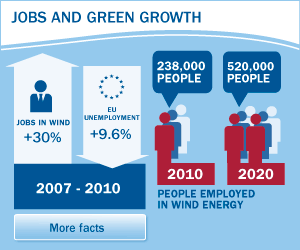
Ana Aguado, CEO Friends of the Supergrid
Europe’s energy infrastructure urgently needs updating. In this interview published in the latest edition of EWEA’s Wind Directions magazine, Ana Aguado, CEO of Friends of the Supergrid, explores how this can be done.
What is the supergrid and why do we need it?
We define the supergrid as “a pan-European transmission network facilitating the integration of large-scale renewable energy and the balancing and transportation of electricity, with the aim of improving the European market”.
With such a definition it is stated quite clearly that in order to transform our energy systems to one that is based on clean and indigenous resources there is no other way but to build a European high voltage network able to integrate all those renewable energy sources, cope with their variability and transport electricity over long distances. We call such an EU planned network the supergrid.
 Alarmist headlines in the UK today proclaimed the “tripling” of energy bills to pay for “green energy”. But the scaremongering belied a story that is positive for the British economy, the climate, the consumer and the European wind energy industry.
Alarmist headlines in the UK today proclaimed the “tripling” of energy bills to pay for “green energy”. But the scaremongering belied a story that is positive for the British economy, the climate, the consumer and the European wind energy industry.
The feature of the upcoming energy bill most media seized on was that energy firms will be allowed to triple the amount of money consumers pay for so-called “green” measures, including renewables but also nuclear power.
 Strategy consultant in energy Radu Magdin argues that Romania is a potential goldmine for renewable energy investors.
Strategy consultant in energy Radu Magdin argues that Romania is a potential goldmine for renewable energy investors.
Romania is a potential paradise for electricity from renewables – we can even say that it is gone with the wind, while solar has big potential as well. This can help with achieving the compulsory EU country targets, but it also brings profits for companies who know how to exploit the Romanian renewable “revolution”. The country has one of the most generous national support schemes, and, recently, smarter legislation in the field. While things can always improve, green light is there.
The biggest European wind park is being built in Romania and there is potential for even more investments. The local wind energy market has proved a rapid growth towards reaching European targets; by the second quarter of 2012, there were over 1,000 MW installed in wind (968 MW of this in 2010 and 2011).

Mark Potter, RSA
By Mark Potter, Head of Renewable Energy at RSA
The number of countries with renewable energy targets more than doubled between 2005 and 2011. This is a clear sign that policymakers have seen the importance of promoting the benefits of clean energy, including the reduction of greenhouse gas emissions, job creation, the development of rural areas and greater independence and security of energy supply.
Last year, €12.6 billion was invested in wind farms in the EU. Nevertheless there seem to be some challenges ahead for this sector since the continuing European sovereign debt crisis is likely to negatively affect future growth, as some countries across Europe begin to see investment and subsidies for further development in renewable energy reduced.
 “At a time of austerity, Greek citizens cannot afford to support practices which prolong energy dependence. The choice of importing oil and gas versus producing renewable energy within the EU, and encouraging clean energy exports among Member States, is obvious”, Greek Energy Minister George Papakonstantinou told Wind Directions magazine recently.
“At a time of austerity, Greek citizens cannot afford to support practices which prolong energy dependence. The choice of importing oil and gas versus producing renewable energy within the EU, and encouraging clean energy exports among Member States, is obvious”, Greek Energy Minister George Papakonstantinou told Wind Directions magazine recently.
He also rebutted the myth that renewables are expensive, saying it was a view he didn’t share, “especially in regard to proven and tested technologies such as wind and solar PV, whose investment costs have been lowered significantly in the last few years.








 Comments
Comments



